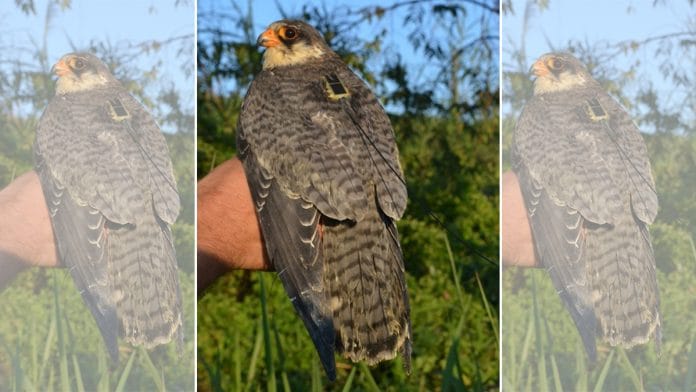New Delhi: A radio-tagged female amur falcon from Nagaland named ‘Longleng’ has stopped transmitting signals, but not before making a record of sorts. The bird, which was fitted with a satellite tag on 3 November 2016 along with three other amur falcons, now holds the “world record” of providing nearly 10,200 data of locations in nearly four years of tracking.
It had transmitted its last signal from Hariatu Sumu area in inner Mongolia, around September-October last year.
Suresh Kumar, a scientist at the Wildlife Institute of India (WII), Delhi, told the Eastern Mirror that Longleng “holds the ‘world record’ of providing nearly 10,200 data of locations and clocking 1,50,000 km approximately”. Kumar also said the total number of days tracked, since Longleng was radio-tagged, were 1,331.
Longleng weighed 185 gram, with a wing span of 242 mm and 136 mm stretch of central tail feather. The three other falcons that were radio-tagged along with Longleng had stopped transmitting signals over the years.
Meanwhile, Nuklu Phom, a conservationist from Nagaland, was recently awarded the prestigious Whitley Award, worth 40,000 pounds, for creating community-owned forests in the state to protect amur falcons.
Assam students develop portable, cost-effective ventilator
Students of Assam’s Tezpur University have developed a portable ventilator to overcome the shortage of the life-saving machine, amid the devastating Covid-19 pandemic. The Department of Electrical Engineering at the varsity has undertaken the initiative to design the portable ventilator.
The machine was developed by Bihung Muchahary, Aniket Raj, Manish Kumar and Ankita Das under the guidance of Chiranjit Adhikary and Firdausa Ahmed, both of whom worked as guest faculty at the electrical engineering department in the university. The project was supervised by department head Soumik Roy.
Roy has been quoted as saying the ventilator’s design is “sufficiently economic” and one can control as well as monitor ventilator parameters using devices such as mobile phones, tabs and computers. “Besides, it will also prevent both clinicians and doctors from getting infected from the airborne transmission,” he added.
The machine would be available in prices ranging from Rs 8,000 to Rs 15,000, depending on its features.
Also read: From Guwahati to Dimapur, Facebook post drives a ‘movement’ to help people during Covid
Sikkim entrepreneur’s ‘online market’ lets you buy axone, gundruk, using cryptocurrency
An online marketplace called NE Origins by Sikkimese entrepreneur Rewaj Chettri now allows customers to buy authentic products from the eight Northeastern states using cryptocurrency.
It is the first online marketplace in the Northeast to use cryptocurrency as a form of payment. NE Origins was started in July last year.
“You can be from any corner of India and still buy Sikkim Supreme’s famous Dalley chili pepper…Axone from Nagaland, gundruk from Sikkim; you name it, it’s all there,” Chettri told EastMojo. Other products from the region include handicrafts, tea, spices, dry meat, etc.
“I am not holding or transacting through cryptocurrency. I am accepting cryptocurrency, but the money comes to my account in rupees,” Chettri added.
He also said, “Cryptocurrency becomes a very easy option for payment. I was introduced to cryptocurrency around 2012. People feel it’s a scam, but I have seen it grow and I had confidence to accept it. It is an opportunity for me.”
Mizoram woman befriends 93-year-old Myanmar refugee at Covid care centre
C.T. Ramnunmawii from Mizoram, a first-year law student at Delhi’s Lloyd Law College, was admitted to a Covid care facility after she tested positive on returning home last month. A day before she was to be released, a 93-year-old Myanmar refugee was also admitted to the facility.
The nonagenarian woman had come to Aizawl, following the unrest in the neighbouring country, in search of her daughter who had been living in and around the capital city.
After knowing about the elderly woman, Ramnunmawii decided to stay back at the facility and nurse her back to health. Both women were discharged earlier this week.
Also read: For over 10 years, this Sikkim man has kept a lake litter-free at 12,406 ft






